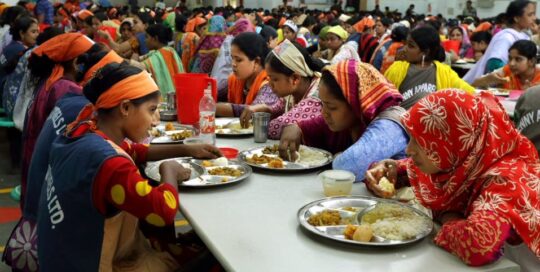Global Alliance for Improved Nutrition (GAIN)
Feasibility Study on Outcomes-Based Finance for Nutrition Programmes in India and Bangladesh
Healthy nutrition forms the basis of health, well-being, and productivity. Yet, there is a significant international shortage of funding to ensure everyone has access to sufficient and healthy nutrition. The international non-profit organization ‘Global Alliance for Improved Nutrition’ (GAIN) is addressing this issue. They do this, among other efforts, for workers in the tea sector and garment factories in Africa and Southeast Asia.
GAIN’s Request
GAIN is a Swiss non-profit organization with a mission to improve the consumption of nutritious and safe food, particularly among those at risk of malnutrition. They do this in twenty countries with government partners, businesses, and civil society organizations. GAIN is a co-founder of the ‘Workforce Nutrition Alliance’ (WNA), a programme that supports employers in implementing or improving programmes for employees who have limited access to good nutrition in their work environment.
GAIN asked Social Finance NL to assess the feasibility of outcome-based financing for these ‘workforce nutrition’ programs. This type of financing, where payment is based on reaching measurable outcomes, has the potential to attract new funders and promote public-private partnerships for the target group. Additionally, this financing approach helps in further substantiating the impact of the programmes.
The SFNL Approach
Result
GAIN has gained more knowledge about outcomes-based financing, and we have a clearer understanding of the potential interest in the workforce nutrition programmes and the financing mechanism. We are working in more detail on how the mechanism can be practically implemented for two specific projects: personnel on tea plantations in India and in garment factories in Bangladesh.
Follow-up
The objective is to be able to engage with interested financiers and investors after the feasibility study to discuss agreements regarding the outcomes and direction of the programme. This is aimed at establishing new funding and implementation phases and would potentially allow us to set up the world’s first Social Impact Bond in the field of nutrition.
About the Collaboration
“Working with the Social Finance NL team has been a pleasure. In developing the Development Impact Bond, we truly collaborate as partners. The SFNL team has taught our organization a great deal about outcome-based financing. Their professionalism and flexibility make for a very positive collaboration. The combination of SFNL’s expertise in outcome-based financing and our expertise in nutrition and workforce nutrition has resulted in a strong proposal for our programs.” – Bärbel Weiligmann, Global Lead Workforce Nutrition
| Project | GAIN |
|---|---|
| Year | 2023 |
| Type | Advisory, Research, Social Impact Bonds |
| Parties | Social Finance NL GAIN NewForesight |
| Location | The Netherlands |






